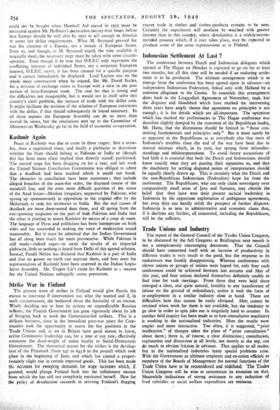Trade Unions and Industry
The report of the General Council of the Trades Union Congress, to be discussed by the full Congress at Bridlington next month is not a conspicuously encouraging document. That the Council should have concerned itself with an increase of productivity in different trades is very much to the good, but the response to its endeavours was frankly disappointing. Whereas conferences with eleven unions or groups of unions were hoped for, only four such conferences could be achieved between last autumn and May of this year, and four unions declared themselves definitely unable to find time for such meetings. From those that were held there emerged a clear, and quite natural, hostility to any transference of labour on the ground of redundancy, unless it took the form of re-employment in a similar industry close at hand. There are difficulties here that cannot be easily obviated. Men cannot be retained when work for them is not available, but the tendency to go slow in order to spin jobs out is singularly hard to counter. In another field inquiry has been made as to how consultative machinery is working in the nationalised industries. Here the results were ampler and more instructive. Too often, it is suggested, " prior notification " of changes takes the place of " prior consultation" about them ; there is, of Course, a clear distinction ; consultation, explanation and discussion at all levels, not merely at the top, can do much to obviate friction in advance. That applies to all trades, but in the nationalised industries many special problems arise. With the Government as ultimate employer and ex-union officials as members of the Boards of Management the normal functions of the Trade Union have to be reconsidered and redefined. The Trades Union Congress will be wise to concentrate its attention on that. Meanwhile indications of strong resistance to any reduction of food subsidies or social welfare expenditure are ominous.






























 Previous page
Previous page